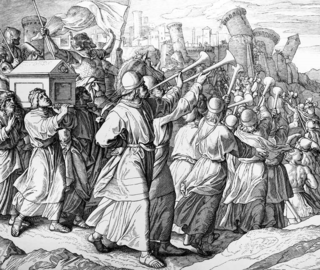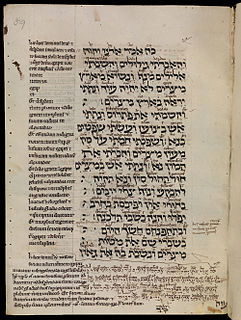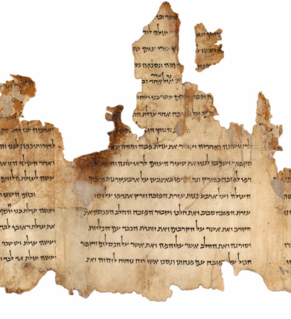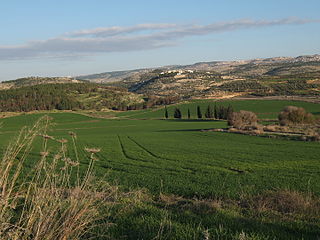
The Kingdom of Israel and the Kingdom of Judah were related kingdoms from the Iron Age period of the ancient Levant. The Kingdom of Israel emerged as an important local power by the 10th century BCE before falling to the Neo-Assyrian Empire in 722 BCE. Israel's southern neighbor, the Kingdom of Judah, emerged in the 8th or 9th century BCE and later became a client state of first the Neo-Assyrian Empire and then the Neo-Babylonian Empire before a revolt against the latter led to its destruction in 586 BCE. Following the fall of Babylon to the Achaemenid Empire under Cyrus the Great in 539 BCE, some Judean exiles returned to Jerusalem, inaugurating the formative period in the development of a distinctive Judahite identity in the province of Yehud Medinata.

The Kingdom of Judah was an Iron Age kingdom of the Southern Levant. The Hebrew Bible depicts it as the successor to the United Monarchy, a term denoting the Kingdom of Israel under biblical kings Saul, David and Solomon and covering the territory of two historical kingdoms, Judah and Israel; however, historians are divided about the veracity of this account. For the parallel history of the southern Kingdom of Judah and its northern neighbour, the Kingdom of Israel, see History of ancient Israel and Judah.

Yahweh was the national god of the Iron Age kingdoms of Israel (Samaria) and Judah. His exact origins are disputed, although they reach back to the early Iron Age and even the Late Bronze: his name may have begun as an epithet of El, head of the Bronze Age Canaanite pantheon, but the earliest plausible mentions of Yahweh are in Egyptian texts that refer to a similar-sounding place name associated with the Shasu nomads of the southern Transjordan.
The Babylonian captivity or Babylonian exile is the period in Jewish history during which a number of people from the ancient Kingdom of Judah were captives in Babylonia. After the Battle of Carchemish in 605 BCE, King Nebuchadnezzar of Babylon besieged Jerusalem, resulting in tribute being paid by King Jehoiakim. Jehoiakim refused to pay tribute in Nebuchadnezzar's fourth year, which led to another siege in Nebuchadnezzar's seventh year, culminating with the death of Jehoiakim and the exile of King Jeconiah, his court and many others; Jeconiah's successor Zedekiah and others were exiled in Nebuchadnezzar's eighteenth year; a later deportation occurred in Nebuchadnezzar's twenty-third year. The dates, numbers of deportations, and numbers of deportees given in the biblical accounts vary. These deportations are dated to 597 BCE for the first, with others dated at 587/586 BCE, and 582/581 BCE respectively.
"Son of man", "son of Adam", or "like a man" are phrases used in the Hebrew Bible, various apocalyptic works of the intertestamental period, and in the Greek New Testament. In the indefinite form used in the Hebrew Bible it is a form of address, or it contrasts human beings against God and the angels, or contrasts foreign nations, which are often represented as animals in apocalyptic writings, with Israel which is represented as human, or it signifies an eschatological human figure.

The four tables give the most commonly accepted dates or ranges of dates for the Old Testament/Hebrew Bible, the Deuterocanonical books and the New Testament, including, where possible, hypotheses about their formation-history.
Zobah or Aram-Zobah was an early Aramean state which extended from the Beqaa Valley along the eastern side of the Anti-Lebanon Mountains reaching Hamath to the north and Damascus to the south, at one time of considerable importance. In I Samuel 14:47, the kings of Zobah were said to have fought with Israelite king Saul. The Cambridge Bible for Schools and Colleges suggests that "the 'kings' were apparently independent chiefs", but by the time of King David there was a single king, Hadadezer bar Rehob.

In the narrative of the conquest of Canaan in the Book of Joshua, the Battle of Jericho is the first battle that is described. According to Joshua 6:1-27, the walls of Jericho fell after Joshua's Israelite army marched around the city blowing their trumpets. Excavations at Tell es-Sultan, the biblical Jericho, have failed to produce data to substantiate the biblical story, and scholars are virtually unanimous that the Book of Joshua holds little historical value.

Danel, father of Aqhat, was a culture hero who appears in an incomplete Ugaritic text of the fourteenth century BCE at Ugarit, Syria, where the name is rendered DN'IL, "El is judge".
The origins of Judaism lie in the Bronze Age amidst polytheistic ancient Semitic religions, specifically Canaanite religion, co-existing with a syncretization with elements of Babylonian religion and of the worship of Yahweh reflected in the early prophetic books of the Hebrew Bible. During the Iron Age I, the Israelite religion became distinct from other Canaanite religions due to the unique monolatristic (proto-monotheistic) worship of Yahweh.

Ezekiel 48 is the forty-eighth chapter of the Book of Ezekiel in the Hebrew Bible or the Old Testament of the Christian Bible. This book contains the prophecies spoken by the prophet Ezekiel, and is a part of the Books of the Prophets. Chapters 40-48 give the ideal picture of a new temple. This chapter contains Ezekiel's vision of the portions of the twelve tribes, Ezekiel 48:1-7,23-29, of the sanctuary, Ezekiel 48:8-14, of the city and suburbs, Ezekiel 48:15-20, and of the prince, Ezekiel 48:21,22; and the dimensions and gates of the city, Ezekiel 48:30-35.

Ezekiel 37 is the thirty-seventh chapter of the Book of Ezekiel in the Hebrew Bible or the Old Testament of the Christian Bible. This book contains the prophecies spoken by the prophet Ezekiel, and is a part of the Books of the Prophets. This chapter contains a vision of the resurrection of dry bones, widely known as the vision of the "valley of dry bones", in which Ezekiel at last assures the captives in Babylon that they will return from exile.

Ezekiel 7 is the seventh chapter of the Book of Ezekiel in the Hebrew Bible or the Old Testament of the Christian Bible. This book contains the prophecies spoken by the prophet Ezekiel, and is a part of the Book of the Prophets.

Ezekiel 6 is the sixth chapter of the Book of Ezekiel in the Hebrew Bible or the Old Testament of the Christian Bible. This book contains the prophecies spoken by the prophet Ezekiel, and is a part of the Book of the Prophets. This chapter contains the prophecies of the judgement of Israel for their idolatry, Ezekiel 6:1-7. A remnant shall be saved, Ezekiel 6:8-10. The prophet is directed to lament their abominations and calamities, Ezekiel 6:11-14. Emphasizing again the prophecies in chapter 5.

Ezekiel 33 is the thirty-third chapter of the Book of Ezekiel in the Hebrew Bible or the Old Testament of the Christian Bible. This book contains the prophecies spoken by the prophet Ezekiel, and is a part of the Books of the Prophets.

Ezekiel 38 is the thirty-eighth chapter of the Book of Ezekiel in the Hebrew Bible or the Old Testament of the Christian Bible. This book contains the prophecies spoken by the prophet Ezekiel, and is a part of the Books of the Prophets. This chapter and the next form a section dealing with "Gog, of the land of Magog."

Ezekiel 43 is the forty-third chapter of the Book of Ezekiel in the Hebrew Bible or the Old Testament of the Christian Bible. This book contains the prophecies spoken by the prophet Ezekiel, and is a part of the Books of the Prophets. Chapters 40-48 give the ideal picture of a new temple. This chapter contains Ezekiel's vision of the glory of God returning into the temple, Ezekiel 43:1-6; God promises to dwell there, if the people will put away their sins, Ezekiel 43:7-9; to incite them to repentance, the prophet shows them the model and law of the house, Ezekiel 43:10-12; the measures of the altar, Ezekiel 43:13-17; the ordinances thereof, Ezekiel 43:18-27.

Ezekiel 47 is the forty-seventh chapter of the Book of Ezekiel in the Hebrew Bible or the Old Testament of the Christian Bible. This book contains the prophecies spoken by the prophet Ezekiel, and is a part of the Books of the Prophets. Chapters 40-48 give the ideal picture of a new temple. This chapter contains Ezekiel's vision of the holy waters, Ezekiel 47:1-5; and their virtue, Ezekiel 47:6-12; the borders of the land, Ezekiel 47:13-21; the division of it by lot, Ezekiel 47:22,23.










